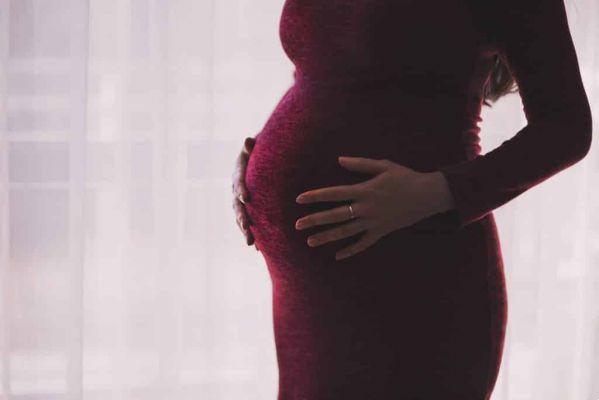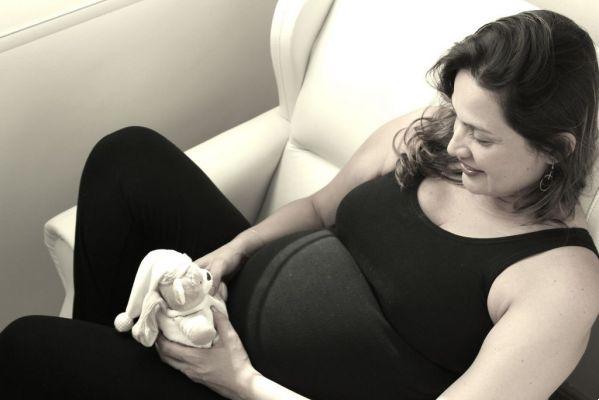A woman discovers that she is pregnant and then immediately feels a little cramping. A few days later, she notices light bleeding and more intense cramping, which is usually more intense on one side. These symptoms usually indicate an ectopic pregnancy, but they can also be linked to a common pregnancy. Do you know what this condition is that affects around 1% of pregnant women? No?! We are going to tell you all about ectopic pregnancy, and know that diagnosing this problem is very important for women's health to be preserved.
What is ectopic pregnancy?
A normal pregnancy begins when an egg is fertilized. It is common for this fertilized egg to attach itself to the uterus, but when an ectopic pregnancy occurs, the egg that has been fertilized is implanted outside the uterus – usually in one of the fallopian tubes, which is a tube responsible for carrying eggs from the uterus. ovaries to the uterus. Ectopic pregnancy is also called tubal pregnancy and, in more unique cases, it can occur in the abdominal cavity or cervix.
Unfortunately, this type of pregnancy cannot be continued, as the fertilized egg cannot survive and the growth of the fetus can compromise several structures of the mother. When left untreated, this condition can cause bleeding, even fatal.
It is important to emphasize that early diagnosis and treatment of this type of pregnancy can preserve the woman's fertility.

Symptoms of ectopic pregnancy
As mentioned earlier, some of the symptoms of an ectopic pregnancy are similar to a normal pregnancy. See some:
– Swollen and sensitive breasts;
– delayed menstruation;
- Tiredness;
– Vaginal bleeding (in some cases, mild);
– Pelvic or abdominal pain after a period of 6 to 8 weeks without menstruation.
As the ectopic pregnancy progresses, more symptoms develop. Among them are:
- Belly pain that gets worse with exertion, which may start on one side only and then spread to the pelvic region;
– Moderate or heavy vaginal bleeding;
- Pain during intercourse;
– Vertigo, dizziness or fainting;
– Signs of hypovolemic shock, which is caused by severe fluid loss;
– Shoulder pain resulting from bleeding under the diaphragm;
– Symptoms of miscarriage.

Causes
One of the most common causes of ectopic pregnancy is when the fallopian tubes are damaged. When this problem exists, a fertilized egg tends to get stuck in one of the compromised areas, and so it starts to develop right there. Here are some causes that can lead to this type of pregnancy:
– Pelvic inflammation, which usually arises with infections caused by gonorrhea or chlamydia;
– Smoking;
– Scarring of the fallopian tubes, resulting from surgery or medical conditions;
– Hormonal conditions;
– Genetic abnormalities;
– Conditions that damage the condition and shape of the reproductive organ and fallopian tubes.

Risk factors
Every woman who has an active sex life has some risk of having an ectopic pregnancy. But this risk can be greater if it is accompanied by certain factors. See examples:
– Infection or inflammation in the fallopian tubes;
– Problems with fertility;
– History of previous ectopic pregnancy;
– Abnormal shapes of the fallopian tubes;
– Age from 35 years old;
– History of previous abortions;
– History of abdominal or pelvic surgery;
– History of endometriosis;
– Pregnancy aided by fertility procedures or treatments;
– Smoking;
– History of STDs;
– Incorrect use of the IUD;
– Pregnancy after tubal ligation.

Seeking medical help
If you've found out you're pregnant, watch out for some symptoms that could indicate an ectopic pregnancy, especially if you fall into one of the risk groups. If you notice that you have some of the symptoms of this type of pregnancy, avoid strenuous activities until you are evaluated by a doctor.
Seek emergency service immediately if:
– You have fainted or lost consciousness;
– You felt an unexpected and sharp pain in your pelvis or belly;
– You had heavy vaginal bleeding.
Make an appointment for a medical appointment as soon as possible if:
– You feel dizzy or have vertigo;
– You have the feeling that you are going to faint;
– You have had vaginal bleeding, whether light, moderate or heavy;
– You have had pain or cramping in your pelvis or belly.
It is worth emphasizing that you should look for a gynecologist or obstetrician. Only these specialists can arrive at the diagnosis of an ectopic pregnancy. From the medical consultation, you will undergo tests and, if this type of pregnancy is confirmed, you will undergo specific treatment and take certain precautions, always maintaining medical monitoring. But know that each case is a case!

How does the treatment work?
Once it is confirmed that your pregnancy is ectopic, the doctor will have two decisions to make, but it all depends on the size of the gestational sac. If it is small, the treatment can be done with a chemotherapy drug that has the ability to dissolve the embryo's tissue and at the same time preserve the affected tube. If it is large, surgery will be necessary, in which the surgeon will analyze the situation to decide whether the affected tube should be removed or not.
Does ectopic pregnancy affect fertility?
No matter how much one of the fallopian tubes is removed, the woman's fertility does not change qualitatively. But if both tubes have problems or changes, it is possible that fertility will be decreased. Even so, treatments that help in the beginning of a pregnancy, such as assisted reproduction, can help in this case.
Seeking family support
If you have an ectopic pregnancy and experience the loss, respect your and your partner's emotional recovery time. Some women develop depression after miscarriage, and looking to someone you love for support is a good option. If some depressive symptoms last for more than two weeks, talk to your doctor, as he will help you in the best way possible.
Understand that talking about this subject with people who have also been through what you are going through now is something that can help you ease your feelings and also help you easily express what you usually keep to yourself. Don't be afraid and remember: it's not your fault!

Can ectopic pregnancy be prevented?
No! There are no ways to prevent this type of pregnancy from happening, but there are ways to reduce certain risk factors. Always use condoms in sexual relations to avoid STDs and, therefore, to prevent inflammatory diseases and also to pay attention to the number of sexual partners, are good examples.
You may also like
- Understand how pregnancy works after 30
- Learn about stereogestation: pregnancy after 9 months
- Watch out for the 5 problems that can prevent pregnancy
If by any chance you have already had this type of pregnancy, before deciding to get pregnant again, talk to your doctor. Always keep follow-up with a trusted specialist, as from the moment you are pregnant, he will carefully monitor your pregnancy. Don't miss any tests, because the first tests to be done at the beginning of a pregnancy can detect a possible ectopic pregnancy early, as well as ensure that everything is within the normal range and make you safe!

























